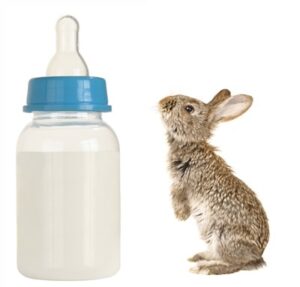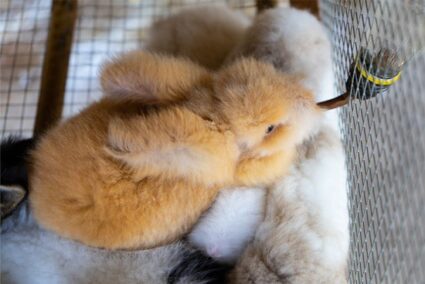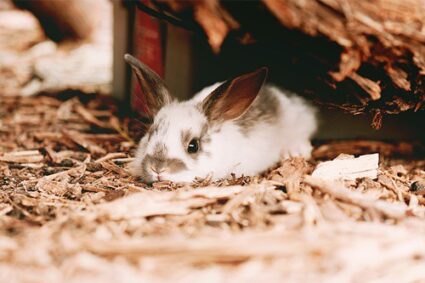Baby rabbits rely upon milk to survive, even though they feed less frequently than other small animals. If a rabbit’s mother is unavailable to feed her young, a nutritious replacement will be required. Rabbits move onto solid food relatively quickly, but will not survive without milk.
Cow milk is full of hormones, lactose, blood, pus, and traces of medication. Rabbits have sensitive stomachs and are unable to vomit. Your pet cannot purge her stomach if she consumes something toxic.
In an emergency, you could offer your rabbit pure goat milk. This will be easier for a baby lagomorph to digest than cow milk. But baby rabbits should always be fed a specific formula. Here’s some further advice on what to feed a baby rabbit.
Do Baby Rabbits Need Milk?
Like all mammals, baby rabbits depend upon milk from their mother to survive. Rabbits differ from many other animals, though. A mother rabbit does not feed her babies constantly. She only does so once a day, for around five minutes.
By the time she reaches two weeks, your rabbit starts to eat solids. She will eat the same food as her mother by the age of four weeks. Despite this, she still needs milk up to the age of six weeks. This provides additional nourishment.
Rabbit milk is unique among animals. It contains considerably more calories than most types of animal milk. This is because baby rabbits eat less frequently.
Not all baby rabbits have access to their mother’s milk. This could apply to both wild and domestic rabbits. A nest of wild rabbits may find themselves orphaned. Baby rabbits also wander away from a nest and get lost.
It’s also possible that a baby rabbit in captivity is separated from her mother. This should not happen until the rabbit is eight weeks old. Occasionally, it is unavoidable, though. The mother rabbit may reject her young or die.
In such an instance, the baby rabbit will still require milk. The burden of care falls upon you. Rabbits have particular needs, so you cannot rely on cow milk.
Can Baby Rabbits Drink Cow Milk?
Cow milk is not suitable for baby rabbits. In fact, cow milk may kill a rabbit. World Rabbit Science claims that the mortality rate of baby rabbits averages as high as 20%. Feeding cow milk is a needless risk. The ingredients pose a range of health risks. These include:
- Antibiotics. Many cows are riddled with disease and infection. These issues are treated with medication. These treatments make their way into the milk you are feeding a rabbit.
- Pus. Cow milk contains pus that seeps from infected udders. This pus carries the risk of bacterial infection.
- Blood. Milking a cow is not a pain-free experience. The cow is likely to bleed during the process. Traces of this blood will make its way into the bottled milk.
- Fat and Protein. Cow milk is high in both of these food groups. Too high for most rabbits, who only need small quantities. Excess fat and protein cause diarrhea in rabbits.
- Hormones. Cows are injected with hormones. Some of these are designed to calm the cow down, as farm life can be stressful. Others increase milk production. None are rabbit-friendly.
Rabbits cannot cope with most of these additional ingredients. They will likely leave the rabbit feeling unwell. Unfortunately, rabbits are not capable of vomiting. This means your pet cannot purge her stomach of toxic cow milk. To be on the safe side, never feed a baby rabbit cow milk.

Can Baby Rabbits Drink Goat Milk?
Rabbits find goat milk easier to tolerate. This does not mean that it can necessarily be considered rabbit-safe, though. It should be used as part of a formula.
The main difference between cow and goat milk is the sugar and lactose content. Goat milk is considerably lighter in both of these things. This means it’s less likely to trigger an adverse reaction.
Goat milk contains less protein and fat than cow milk. Goats are also treated with fewer hormones. This makes goat milk a little gentler on a rabbit’s digestive system.
Goat milk is fine as an emergency measure when feeding baby rabbits. Wild rabbits are more likely to cope with it. Wherever possible, feed her a specialist product that’s intended for rabbits.
So What Milk Can Rabbits Drink?
Baby rabbits should drink a special formula. This is known as Kitten Milk Replacer. It is possible to nourish a baby rabbit with this substance. While the cat food aisle of a pet store will stock kitten milk. This is NOT suitable for rabbits, and must never be given to your pet.
Baby rabbits are referred to as kittens, just like baby cats. This is where the similarities end, though. The needs of a young cat are different to that of a rabbit.
Caring for an Orphaned Baby Rabbit
If you live in a rural area, you may come across a nest of baby rabbits. You may even find a nest on your property. Rabbit mothers often build nests in hedges, where she feels her young will be safe.
It’s common to find a nest of baby rabbits with no mother in sight. How are the babies supposed to survive alone? Rabbits are frail and delicate at the best of times. When they’re babies, this goes double. How could they possibly be left alone? They must be orphaned.
While this is an understandable assumption, it’s often inaccurate. A mother rabbit will leave her babies unattended for over 23 hours of every day. This is not because she is cold and uncaring. It’s actually to protect her young.
There are two things that you need to know. Rabbits are aware they are a prey species. Rabbit milk is rich and calorific. This means that baby rabbits need only feed once a day for around five minutes.
With these facts in mind, it makes sense that a mother leaves the nest. An adult rabbit stands a fighting chance of outrunning a predator. Baby rabbits have no such chance. The mother is attempting to keep predators away from her nest.
The mother rabbit will return to the nest for feeding once a day. The rest of the time, she leaves her babies in hiding. As a result, most ‘orphaned’ rabbits are nothing of the kind, despite appearances.
If you find a nest of baby rabbits, leave it be. Check the next day, though. If nothing has changed, the rabbits may be orphaned. At this stage, call a wildlife center. Wildlife Rehabber lists these by state. In the meantime, feed the rabbits.

What to Feed Baby Rabbits without a Mother
You’ll need to ensure that the baby rabbits do not have a mother. Veterinary Partner discusses the warning signs that a rabbit is not feeding:
- The rabbit should have a healthy, full stomach. If her stomach is sunken, she is likely hungry.
- The rabbit should be active. She may even try to run away from you. A sluggish and lethargic rabbit is rarely healthy.
- The rabbit should have a pink skin tone. If she is starting to turn blue, she has not been fed.
- The rabbit should be more or less silent. Rabbits know that noise will attract predators. If the rabbit is crying out, she is hungry and frightened.
If you have established that the rabbits are in danger, you’ll need to think about feeding them. Goat milk alone may be suitable in an emergency. Realistically, you’ll need a baby rabbit milk substitute.
How to Make a Baby Bunny Milk Substitute
If you’re going to tend to a baby rabbit, you need to use a specific Kitten Milk Replacer. If unavailable, you can make up this meal replacement at home. To create your own homemade rabbit milk replacer, follow this recipe:
- Pour one cup of goat milk, and stir in an additional 56 grams of powdered goat milk.
- Stir in a tablespoon of sugar-free heavy whipping cream. This will make the formula richer, and replicate the calories found in rabbit milk.
- Heat the formula until it’s around 98-100 degrees Fahrenheit.
These ingredients will meet the needs of a young rabbit, replacing a mother’s milk like-for-like. However, if in doubt, purchase a pre-mixed milk replacement.
How Often Should Orphaned Baby Rabbits be Fed?
Just as important as the quality of milk is the quantity. This can be a real balancing act. Over-feeding or under-feeding a baby rabbit are both equally dangerous. As a rule, follow these guidelines for feeding a baby rabbit. You might need to guess the age if the rabbit was wild.
| < 1 Week Old | 2 or 2.5 cc/ml per feeding, twice a day |
| 1 – 2 Weeks Old | Between 5 and 7 cc/ml per feeding, twice a day |
| 2 – 3 Weeks Old | Between 7 and 13 cc/ml per feeding, twice a day |
| 3 – 6 Weeks Old | Between 13 and 15 cc/ml per feeding, twice a day |
If you follow these guidelines, the rabbit will flourish. The maximum time required for milk feeding is six weeks. You may find that your rabbit wishes to wean earlier, though. Encourage this if so.
Rabbits start to eat solid food after a week or two. The sooner your rabbit starts consuming hay for fiber, the better. Remember, a rabbit can’t eat too much hay. The same cannot be said about milk formula.
How to Bottle Feed Orphaned Baby Rabbits
Visit a vet or pet store and ask for a specialist animal feeding bottle. This must be entirely sterile before you use it.
- Get the rabbit comfortable, and possibly wrapped in a towel. Do not allow the rabbit to roll onto her back. She should be sitting upright to avoid flooding her lungs with fluid.
- Fill the bottle with formula and soothe the rabbit. Place the nipple of the bottle in the corner of her mouth. Remove it if she starts to chew. It may take a few attempts to get the rabbit used to having a syringe in her mouth.
- Once the rabbit accepts the bottle, SLOWLY release the milk replacement to the quantity described above. Never release the full amount at once. This leaves the rabbit at risk of choking.
- Repeat this twice a day until the rabbit is weaned.
Rabbits should never be fed cow milk under any circumstances. Rabbits cannot digest cow milk and are unlikely to survive long beyond the meal. If you find yourself unexpectedly caring for a baby rabbit, use Kitten Milk Replacer. The rabbit will feel full on solids at eight weeks of age.

